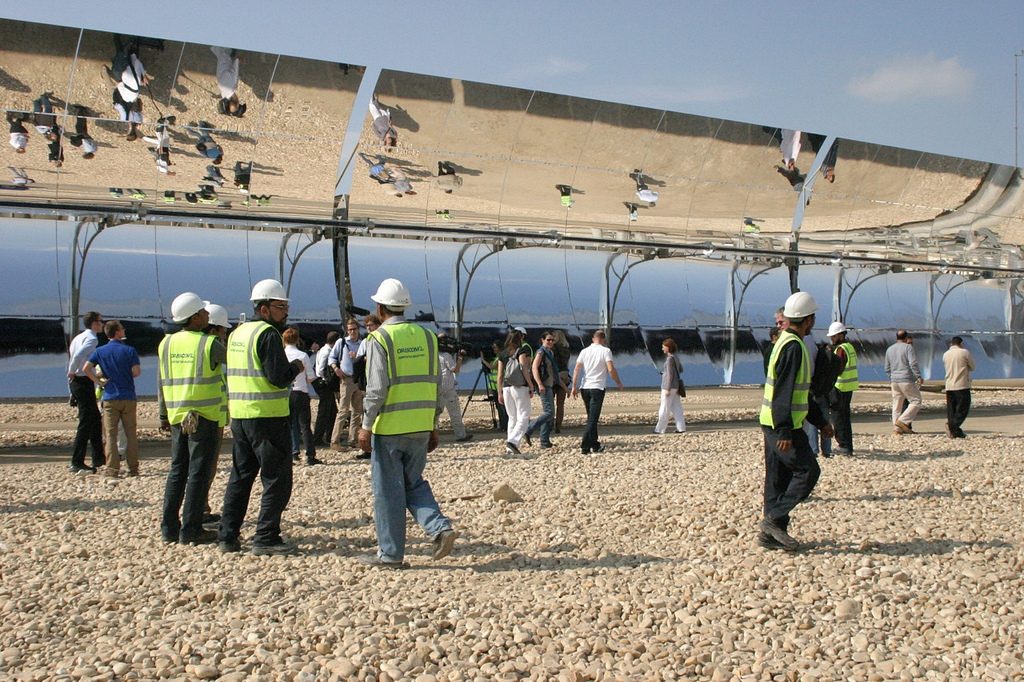Preparatory material
Our ideas for a good energy system need to address who controls and profits from energy resources. Oil, gas, and coal corporations take resources and wealth from the global South, benefiting the North and elites in the South. And the droughts, floods, and loss of farmland brought on by climate change hit some of the world’s most impoverished communities in the Global South hardest.
But renewable sources of energy can repeat the same pattern. Hamza Hamouchene writes about Desertec, a grand scheme to install solar panels in the Sahara desert and bring the electricity by cable to Europe:
“a familiar ‘colonial’ scheme is being rolled in front of our eyes: the unrestricted flow of cheap natural resources from the Global South to the rich industrialized North, maintaining a profoundly unjust international division of labour”
So as we develop our visions for a fair, more democratic energy system, we need to think about how it will address this colonial exploitation.
Presentation
Our guest speaker for this session was Diego Di Risio from Observatorio Petrolero Sur (OPSur), Argentina.
This 5-minute video by OPSur features voices from a Mapuche Indigenous community living next door to a fracking operation controlled by US oil giant Chevron and Argentinian national oil company YPF. The video is in Spanish, subtitles are available in English and French.
One more term will be useful for us here. Extractivism:
“the centering of economies around the export of raw materials, such as minerals, fossil fuels and agricultural commodities” (Carmelo Ruiz Marrero)
For the following 13-minute talk, we asked Diego to explain what extractivism and energy colonialism look like in Argentina, what changes OPSur is working towards, and how he sees the challenge of imagining a de-colonised energy system. (You can view Diego’s talk as a video, or listen on Soundcloud here. We filmed over Skype, so excuse the jumpy picture!)
What does de-colonising energy mean? De-colonising can mean different things in different places. In the past two years, new social movements like Rhodes Must Fall have called for de-colonising universities, sciences, arts, calling for these institutions to respect and reflect Indigenous, Black and Brown, and Southern experiences, rather than maintaining the dominance of white perspectives and the Global North.
What does de-colonising energy mean for you? Does it look like challenging who gets to be described and read as energy experts? Like building local self-sufficiency? Like solidarity through crowdfunding? Like reparations to communities living with the effects of pipelines and oil spills? Like Venezuela offering London cheaper oil for subsidised public transport, in exchange for services and expertise?
Webinar
Further reading
In English
On energy colonialism
EJAtlas: searchable web database of environmental justice conflicts around the world. http://ejatlas.org
#StandingRockSyllabus: On #NoDAPL https://nycstandswithstandingrock.wordpress.com/standingrocksyllabus/
“How to talk about #NoDAPL: A Native Perspective” https://transformativespaces.org/2016/10/27/how-to-talk-about-nodapl-a-native-perspective/
“Decolonising energy: transforming carbon colonialism into energy solidarity” – essay excerpt by Platform http://platformlondon.org/2014/11/14/decolonising_energy/
“Desertec: the renewable energy grab?” by Hamza Hamouchene https://newint.org/features/2015/03/01/desertec-long/
“Midwives at Dakota Access Resistance Camps: We Can Decolonize, Respect Women & Mother Earth”. Interview with volunteer midwives at the resistance camp by Democracy Now http://www.democracynow.org/2016/10/18/midwives_at_dakota_access_resistance_camps
Kandi Mossett, Indigenous Environmental Network. “Indigenous Women on the Frontlines”. 30 minute talk about the impacts of fracking in Indigenous communities in North Dakota, focusing on land, contamination, gender violence, and resistance https://www.youtube.com/watch?v=SCRq6dC7V_E
“The Coming Revolution in North Africa: The Struggle for Climate Justice” – interview with Hamza Hamouchene and Mika Minio-Paluello, editors of a new Arabic-language book on climate justice
http://egypt.jadaliyya.com/pages/index/21803/new-texts-out-now_hamza-hamouchene-and-mika-minio-
“Organising Cools the Planet”, a booklet on organising for climate justice by Hillary Moore and Joshua Kahn Russell http://www.climateaccess.org/sites/default/files/Moore%20and%20Russell_Organizing%20Cools%20the%20Planet.pdf
“Venezuelan Oil Deal to Aid Low-Income Londoners” https://venezuelanalysis.com/news/2567
Dash for gas: unconventional expansion in Argentina http://www.foeeurope.org/dash-for-shale-gas-Argentina-190614
“Crude Territory” video series https://www.youtube.com/watch?v=uIixGe2Mp4c&list=PLPgtRK4SeEnxBWzlY7ZBBxUqNl6i3ibsg
“Energy security for whom? For what?” Corner House on Energy Security http://www.thecornerhouse.org.uk/resource/energy-security-whom-what
COP21: time for annex zero, Oil Watch Africa http://oilwatchafrica.org/content/its-time-for-annex-zero/
Global Shale Gas and the Anti-Fracking Movement / En Español, Trade Unions for Energy Democracy http://unionsforenergydemocracy.org/tued-working-paper-1-global-shale-gas-and-the-anti-fracking-movement/
On de-colonial movements and politics
Luke Pearson, “Don’t tell me to ‘get over’ a colonialism that is still being implemented today” https://www.theguardian.com/australia-news/commentisfree/2016/apr/02/dont-tell-me-to-get-over-a-colonialism-that-is-still-being-implemented-today?CMP=share_btn_fb
Shose Kessi, “Time to Decolonise Our Universities” http://www.iol.co.za/sundayindependent/time-to-decolonise-our-universities-1843798
UCT (South Africa) Rhodes Must Fall mission statement https://www.facebook.com/RhodesMustFall/posts/1559394444336048
Rhodes Must Fall reading list https://www.dropbox.com/sh/3i42wanrps2zfpe/AAB3pKZTzVWf3TpvkeTGf3L0a?dl=0
In Spanish / Castellano
“Territorio Crudo” – Un serie de videos sobre los impactos del fracking en Patagonia. Una coproducción del Observatorio Petrolero Sur y el Colectivo Vaca Bonsai. / Video series looking at fracking in Patagonia. By OPSur and Vaca Bonsai.
Todos los episodios / all episodes (English and French subtitles available): https://www.youtube.com/playlist?list=PLeyj5yeghMqos3dHkBn0GYUmTeiGWFTBy
Declaración del encuentro de mujeres frente al extractivismo y al cambio climático, Quito, octubre 2014 https://territorioyfeminismos.org/2014/10/15/encuentro-de-mujeres-frente-al-extractivismo-y-al-cambio-climatico/
Alto Valle Perforado (On unconventional expansion in cities and fruit production regions in Patagonia) http://www.opsur.org.ar/blog/wp-content/uploads/2015/12/Libro-Alto-Valle-perforado-WEB.pdf
Qué entendemos por energía extrema http://www.opsur.org.ar/blog/2016/09/28/que-entendemos-por-energia-extrema/
Infraestructura extrema (translated, originally an article by Nick Hyldiard http://www.opsur.org.ar/blog/2016/09/28/anular-el-espacio-a-traves-del-tiempo/
In Arabic
الثورة القادمة في شمال أفريقيا: الكفاح من أجل العدالة المناخية / ‘The coming revolution: the fight for Climate Justice & survival’. Collection of essays on climate justice by Global South authors, edited by Hamza Hamouchene and Mika Minio-Paluello. pdf file
To continue the Democratising Energy Peer Learning Course:
- Session 2: Community and Cooperative control
- Session 3: State control – National and municipal
- Session 4: Labour and trade unions in the energy transition
- Session 5: Energy poverty and access
- Session 6: Technology for the energy transition
